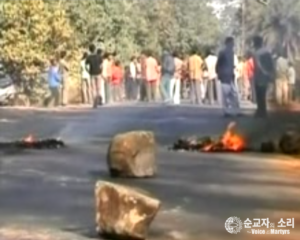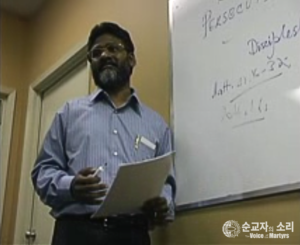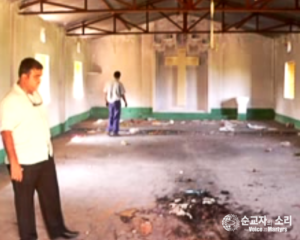INDIA: ARCHBISHOP URGES PERSECUTED CHRISTIANS TO FORGIVE THEIR ATTACKERS

(Photo taken in 2008) Villagers stand by the burning remains of their village.
Late last month, Christians from the Kandhamal region of Odisha held a memorial service for those who died in the seven week massacre that occurred in the region ten years ago. After the murder of Hindu leader Swami Lakshmanananda Saraswati, false rumours began that Christians were to blame. Militant Hindu mobs rampaged through the Kandhamal region, looting villages; destroying over 5,000 houses and 300 churches; and displacing more than 56,000 Christians.
At the memorial service, Archbishop Barwa encouraged his listeners to pursue peace, reconciliation, and forgiveness. According to Voice of the Martyrs Korea representative Hyun Sook Foley, however, Christians within the Kandhamal region do not sense remorse on the part of those who were responsible for the massacre.
“Ministry partners inform us that many of the people who participated in the mob have not accepted responsibility for their actions or sought forgiveness,” representative Foley explains. “Although most people acknowledge that the massacre was horrible, they often blame outside organizations for riling them up and, rather than making reparations for their past actions, have continued to put pressure on the Christians in the area.”
According to representative Foley, one Christian who was interviewed after the massacre, the Reverend Sudhakar Mondithoka, stressed the strong persecution Christians were already facing beforehand. In his 2009 interview with Voice of the Martyrs Canada, Reverend Mondithoka said:
“[The Hindu mob] did what they always planned to do… [Their attack] was organized, it was pre-planned. They blocked the way [into the villages] by cutting huge trees and rolling rocks onto the road so that no one could come [into the villages] and they could do what they always wanted to do.”
Even now, Christians in this area are continuing to face persecution from their Hindu neighbors.
“Often, we don’t think of India as a place where Christians face persecution because in many areas Christians are free to practice their religion,” representative Foley says. “But Odisha is one of 7 regions in India where there is strong persecution against Christians.”
“While 7 regions may seem like a small number at first, keep in mind that the population of these seven regions combined is higher than most countries in the world,” representative Foley adds. “And most of these regions still have anti-conversion laws.”

(Photo taken in 2009) Reverend Sudhakar Mondithoka, a partner of VOM, teaches Indian Christians about persecution.
According to representative Foley, a majority of the persecution in these regions is not from the governments, but from society.
“Many of these regions are still heavily impacted by the caste system. Some Hindus in these regions feel that Christianity exploits the disadvantaged station of the lower caste because 70% of all Christians are from this caste,” representative Foley explains. “Even though the Indian constitution ensures freedom of religion, Christians are persecuted by their own neighbors.”
Because laws are already in place to ensure the safety of Christians, representative Foley contends that political solutions to the problem, while important, are not powerful enough.
“We must join our Indian brothers and sisters in informed prayer,” representative Foley says. “And the most common prayer request they have is for the hearts of their attackers to be moved into seeking forgiveness. Although many have already forgiven their attackers, these Christians are worried when they see them without remorse and long more than anything for their attackers to repent of their sin and receive God’s forgiveness.”

(Photo taken in 2008) Christians return back to the remains of their church.
To better inform your prayers for the Indian church, read Voice of the Martyrs Korea’s India Country profile. You can also visit the Voice of the Martyrs Korea website (www.vomkorea.kr) to read the profiles of the more than 70 other countries around the world where Christians are persecuted.

